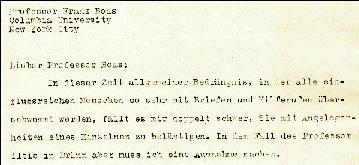In this letter from April, 1938, Einstein steps outside of the official, administrative capacity to provide a glimpse of the deep, personal commitment he shared with Boas. He approached Boas humbly, even reluctantly, but with clear purpose.

"In such troubled times as these, in which all men of influence are deluged with letters and appeals for help, it pains me doubly to annoy you with the affairs of a single man. In the case of Professor Iltis of Bruü, however, I must make an exception."
With his liberal political convictions and academic connections throughout the country, Boas seemed a likely choice to help secure an invitation for Iltis to join the faculty at an American university, virtually assuring him of receiving a "professor's visa" and paving the way for him to come to America.
Iltis, though, presented a bit of a challenge, if only because he was not a standard academic. A teacher at the Technical High School in Brünn, Czechoslovakia, and Director of the Gregor Mendel Museum, Iltis was the well-respected biographer of Gregor Mendel, but not a practicing geneticist. A political liberal, his troubles stemmed partly from his Jewish ancestry, but more immediately from publishing a work assailing the German "race-mystique" (in 1936, he had asked Boas for help in finding an American publisher for the book). By the time of Einstein's letter, written one month after Hitler had annexed Austria, Iltis was clearly "politically suspect," and his life was in imminent peril. For Einstein, this was no abstract issue of the rights of expression, but a palpable, personal struggle for the life of a fellow scientist. "I believe," he continued, "that it is our duty to do our best to rescue this man while there is still time."
 Boas and his colleague at Columbia University, the geneticist L.C. Dunn, immediately stepped into action. Working with other members of the Emergency Committee for Displaced German Scholars, Boas and Dunn struggled to find an institution willing to offer Iltis a positon, finally succeeding in a non-paying position at Washington State University at the end of October, 1938. In the end, though, Iltis took a position at the Fredericksburg School in Virginia in the hope (as the Seceretary of the Emergency Committee put it) of finding a university position on the east coast, rather than in Washington "where the American Legion is firmly entrenched and where there is hostility toward aliens." Ultimately, he landed at Mary Washington College, teaching biology.
Boas and his colleague at Columbia University, the geneticist L.C. Dunn, immediately stepped into action. Working with other members of the Emergency Committee for Displaced German Scholars, Boas and Dunn struggled to find an institution willing to offer Iltis a positon, finally succeeding in a non-paying position at Washington State University at the end of October, 1938. In the end, though, Iltis took a position at the Fredericksburg School in Virginia in the hope (as the Seceretary of the Emergency Committee put it) of finding a university position on the east coast, rather than in Washington "where the American Legion is firmly entrenched and where there is hostility toward aliens." Ultimately, he landed at Mary Washington College, teaching biology.
So often with figures of the stature of Einstein and Boas, the magnitude of their intellectual achievements casts a deep shadow over their personal beliefs. Hugo Iltis reminds us the humanity shining through.
